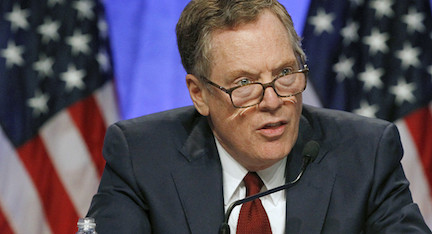The Trump administration is considering re-imposing tariffs on aluminum imports from Canada and an announcement could come by the end of the week, according to people familiar with the matter.
If Canada refuses to impose export restrictions on aluminum, the U.S. will announce Friday the re-imposition of 10% tariffs on aluminum from the country and implement the tariffs by July 1, according to the people, who asked not to be identified because the information isn’t public.
Lighthizer told the Senate Finance Committee in a hearing last week that recent surges in metal imports from North American neighbors are “of genuine concern to us now,” and that his office was looking at the issue.

“I would say there have been surges on steel and aluminum, substantially from Canada, some from Mexico, and it is something that we’re looking at and talking to both Mexico and Canada about,” he told the panel’s top Republican, Senator Chuck Grassley from Iowa.
A spokesman for the USTR didn’t respond to an emailed request for comment.
Producer Split
Under the May 2019 agreement, which resulted in initial tariffs being lifted, Canada has to limit its retaliation to the U.S. metals sector and cannot hit American agriculture, Lighthizer told Grassley.
Ironically, the three U.S. aluminum producers—Alcoa Corp., Century Aluminum Co. and Magnitude 7 Metals LLC—disagree whether tariffs should be reimposed.
The American Primary Aluminum Association, which represents Century Aluminum and Magnitude 7 Metals, has asked Lighthizer to reimpose a 10% tariff on imports of Canadian aluminum, saying a rise in metal coming from the country has caused the price to collapse.
The Aluminum Association of the U.S., which represents Alcoa Corp., Rio Tinto Group and dozens of other aluminum-parts makers, argues instead that imports are virtually unchanged since 2017.
Alcoa CFO William Oplinger said at a virtual bank conference in June that China’s overcapacity subsidized by the government is the real problem, and that he supports free trade with “those who trade freely, especially the Canadians.”
Market Malaise
The benchmark price of aluminum traded in London is down 11% this year, and the price paid to ship metal to the U.S. Midwest—a critical part of the all-in price for domestic producers—is down more than 40%.
Aluminum producers are struggling along with other businesses amid the pandemic. Alcoa, the top U.S. aluminum producer, in April cut the remaining capacity at its smelter in Ferndale, Washington. The same month, Century reported its lowest quarterly sales since the third quarter of 2017, citing demand destruction caused by the health crisis and commodity prices falling at an “unprecedented” pace.
An agreement reached between the three North American countries in May 2019 included a monitoring and a mechanism to prevent increases in exports, but also stipulated that tariffs on metals could be reimposed “if surges in imports of specific steel and aluminum products occur.”
Questions remain what a renewed tariff battle could do to the trade relationship between Canada and the U.S., which had been improving since last year when the sides were able to reach an agreement on the new Nafta deal.
“It has damaged the trust relationship between our two countries,” Bruce Heyman, a former U.S. ambassador to Canada who served during the Obama administration, said in a telephone interview. “When we do these kind of things we do much more damage to the larger relationship than we can even calculate.”






